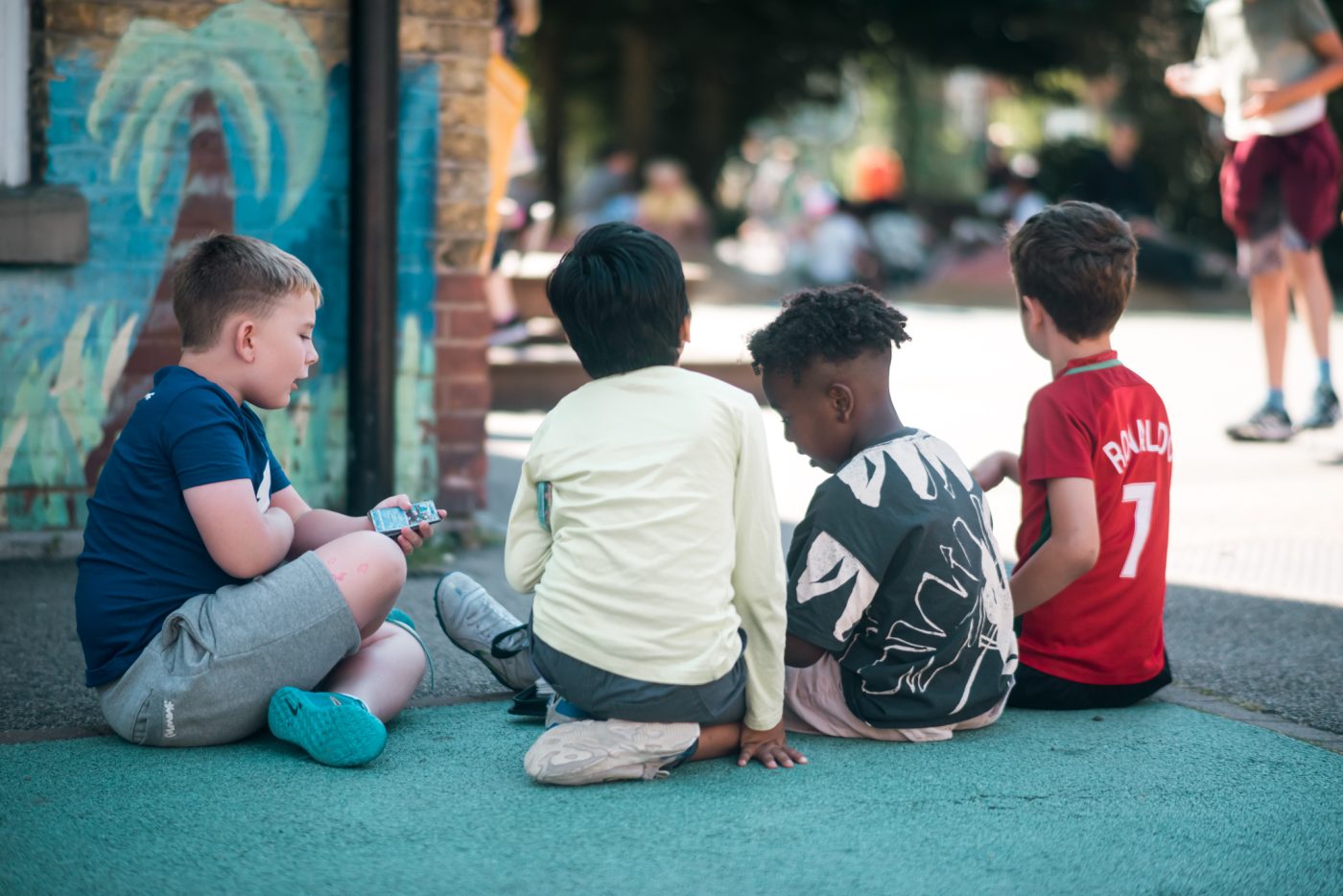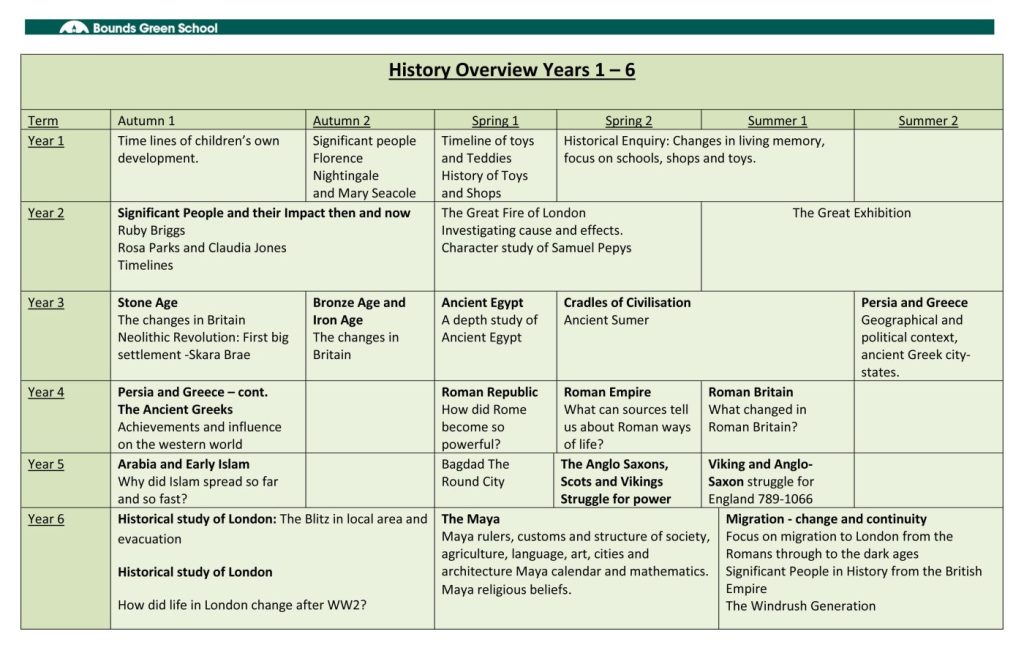History

History
Bounds Green is a happy and successful school community because:
· We NURTURE each unique child to value themselves and develop self-worth in order to thrive in life.
· We VALUE respect and responsibility, individuality and inclusivity, confidence and kindness.
· We CHALLENGE every child to be ambitious and achieve success in their learning.
Long History Overview Years 1-6..
Pupils gain a knowledge and understanding of Britain’s past and that of the wider world. It inspires children’s curiosity to know more about the past and equips children to ask perceptive questions, think critically, weigh evidence, sift arguments and develop perspective and judgement.
Intent
At Bounds Green we endeavour to provide a rich history curriculum that is broad in scope, is coherent and carefully sequenced in order for our children to gain a deep knowledge and understanding of how Britain has influenced and been influenced by the global community. We teach children to be curious and ask perceptive questions about the past. We encourage pupils to think critically and understand the method of historical enquiry through evaluating sources and discerning the construction of contrasting arguments/ interpretations. It is important that pupils understand: the complexity of people’s lives; processes of change; differences in societies and relationships between various groups; as well as their own identity and the challenges faced by their generation. Over the different key stages, children will learn about and appreciate the various contributions made by different social groups to the world as a whole. We are lucky to have a culturally diverse school community and we highlight the importance of understanding the different groups within. It is therefore important for learning to be linked to the identities of our pupils and of our wider local community. It is a key aim for children to have a good grasp of the earliest times in human history up to the present day. A firm understanding of chronology is embedded in our pupils throughout the delivery of our curriculum in order for them to aim historical perspective surrounding concepts that have shaped and still impact our world today, such as: civilisation, slavery, trade, empires, politics, rulers and settlements; hence developing their interest in the past, inspiring their curiosity and motivation to learn.
Implementation
Our history curriculum is shaped by our school vision which aims to challenge and nurture all children, regardless of background, ability, or additional needs, so they can flourish in their educational journey, well beyond their time with us. At Bounds Green, topic areas are carefully mapped out to provide a broad and balanced curriculum. The topics taught have been carefully selected so that there are opportunities for cross-curricular learning which helps to fully equip children with transferrable knowledge and skills to aid progression. The teaching of history at Bounds Green focuses on encouraging children to ‘think as historians’ and uses a wide range of pedagogical strategies to achieve this.
Our students in the foundation stage will be given opportunities to find out about the past and present and how the world around them has shaped their own lives and those of the people in their family. They are encouraged to notice the similarities between themselves and others, celebrating a variety of cultures and traditions. We support children with observations and explorations of their physical world and community in order to find out about people, places, technology and the natural world.
In Key Stage One, children are taught and encouraged to use common vocabulary which is associated with the passing of time. Our children learn how to make comparisons between life today and in the past. They study the lives and lifestyles of familiar people in the recent past and learn about significant people and events in the more distant past, such as: Guy Fawkes, Florence Nightingale and the Great Fire of London at the end of year 2.
In lower Key Stage Two, children find out about changes in Britain from the Stone Age to the Iron Age, and the achievements of the earliest civilisations, such as: Ancient Egypt and the Indus Valley, making comparisons where relevant. Pupils will also expand their knowledge surrounding ancient civilisations and empires in Europe, with a focus on the Ancient Greeks and the development of the Roman Empire.
In upper Key Stage Two, they follow a bespoke curriculum for history. This allows children to deepen their knowledge of ancient civilisations as they learn about the achievements of European, such as the Anglo-Saxons, and non-European ancient civilisations, such as the society in Baghdad. They also learn about different aspects of British and local history and discuss why and how events have happened or changed and the legacies we see in life today.
All year groups have a strong focus on vocabulary. We believe that as the range of vocabulary is developed, our children become more confident and better able to appreciate, interpret and evaluate evidence the past has left behind. We further enhance our history curriculum through the addition of visitors to the school, drama, use of artefacts, day trips and residential visits where possible.
Impact
By the end of Upper Key Stage Two, Bounds Green children will:
- be secure in their knowledge and understanding of people, events and contexts from the historical periods covered.
- have the ability to think critically about history and communicate confidently in styles appropriate to a range of audiences.
- have the knowledge to consistently support, evaluate and challenge their own and others’ views using detailed, appropriate and accurate historical evidence derived from a range of sources.
- have the knowledge and ability to think, reflect, debate, discuss and evaluate the past, forming and responding to questions and lines of enquiry.
- respect historical evidence and have the knowledge and ability to make robust and critical use of it to support their explanations and judgements.
- have a passion for history and an enthusiastic engagement in learning through a desire to embrace challenging activities.


